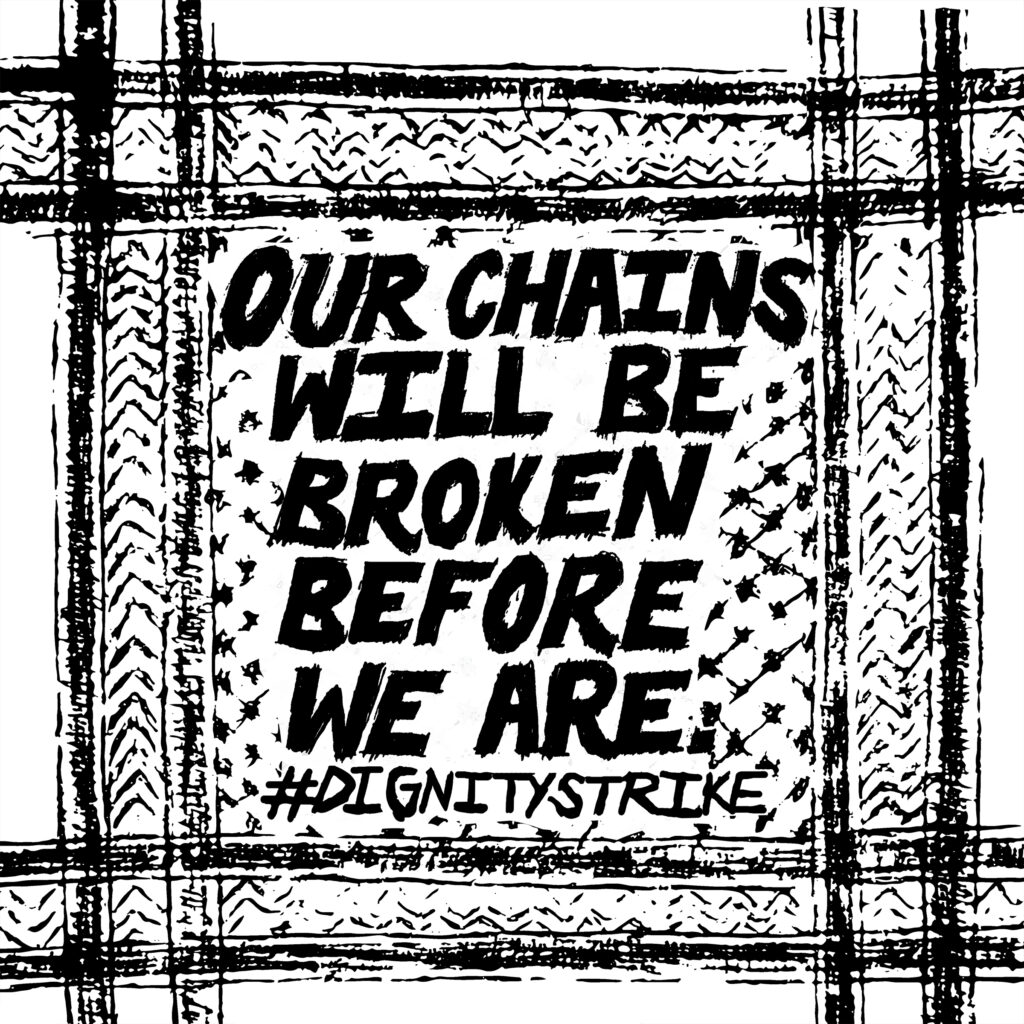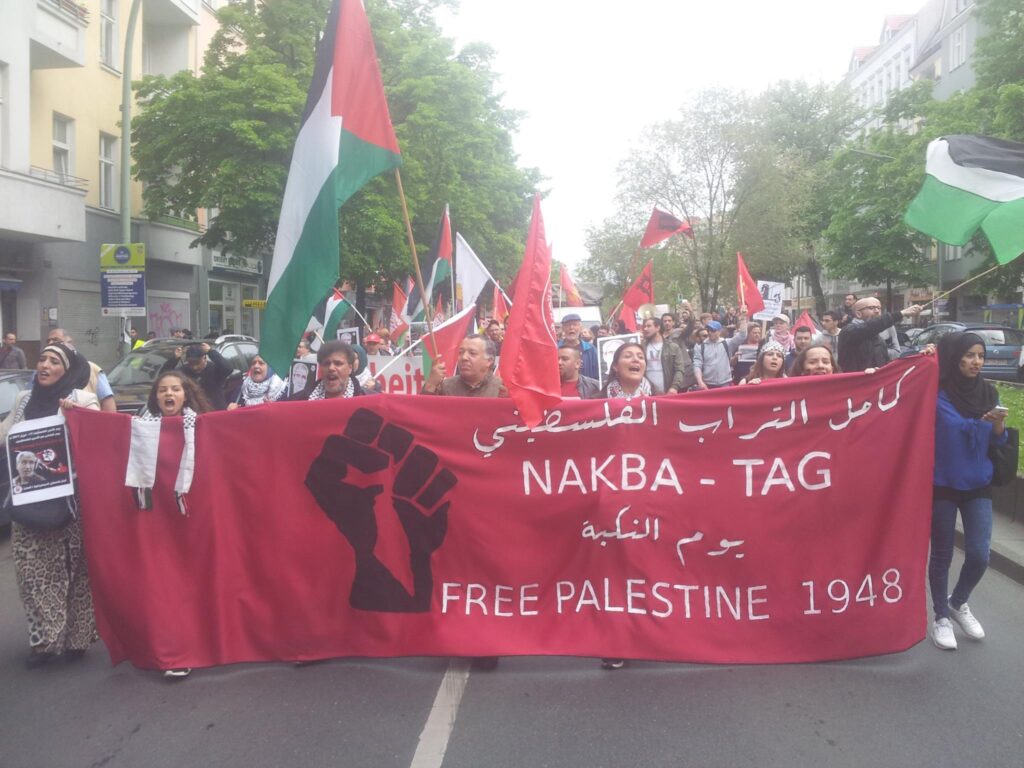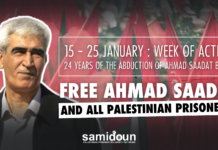
On Sunday, 14 May, Palestinian prisoners entered into their 28th day of hunger strike in Israeli prisons. 1500 Palestinian prisoners launched the strike on 17 April, Palestinian Prisoners’ Day, for a series of basic demands, including: end to the denials of family visits, proper health care and medical treatment, the right to pursue distance higher education, and an end to solitary confinement and administrative detention, imprisonment without charge or trial.
On Friday, 12 May, 11 prisoners in Gilboa prison joined the open hunger strike. In addition, despite some earlier reports, Issa Qaraqe of the Prisoners’ Affairs Commission stated that no negotiations have yet taken place between the prisoners and Israeli officials; instead, Israeli officials have demanded that Palestinian prisoners first end their strike.

Also, on Friday, 12 May, Israeli occupation forces shot and killed “the martyr of dignity,” Saba Obeid, 22, as he participated in a protest march in support of the prisoners in the village of Nabi Saleh, northwest of Ramallah.
Palestinian prisoners have faced harsh repression since the launch of the strike. Strikers have been routinely denied family and legal visits, had their personal belongings confiscated – including the salt that they take with water to preserve their life and health – pressured to break the strike in exchange for medical care, routinely abusively transferred from prison to prison and thrown in isolation. Some prisoners have been transferred – in a physically grueling, lengthy process in a vehicle called the “bosta” – seven times since the beginning of the strike.
One of the hunger striking Palestinian leaders who has been routinely denied legal visits is Ahmad Sa’adat, the General Secretary of the Popular Front for the Liberation of Palestine. Addameer Prisoner Support and Human Rights Association has reportedly obtained a visit with Sa’adat to take place today, Sunday, 14 May, at 3:00 pm, only after petitioning the courts after repeated denials of visits with Sa’adat since he joined the strike on 4 May.
Palestinian lawyers who obtained visits with their hunger-striking clients after legal actions have reported the use of tear gas and police dogs in raids and frequent inspections inside hunger strikers’ cells, as well as the presence of insects and filthy conditions in the cells the strikers were transferred to. Dozens of prisoners were transferred to so-called “field hospitals” after a deterioration in their health condition; many prisoners have reported difficulty or inability to stand, severe pain and even vomiting blood.
Throughout Palestine, marches, demonstrations, protests and solidarity hunger strikes continued in support of the prisoners. On Friday, in addition to the killing of Saba Obeid, dozens of Palestinians were wounded by Israeli occupation forces firing tear gas and rubber-coated metal bullets on demonstrators. On Friday evening, 12 May, another ten organizers from Beit Sahour near Bethlehem launched an open hunger strike in support of the prisoners.
The Palestinian National Committee to Support the Strike issued a statement and call for action following the killing of Obeid, “saluting the heroic spirit of the martyr Saba Obeid, a martyr of the battle of empty stomachs of our brave prisoners in Israeli jails.” The Committee urged action to call for a special session of the United Nations General Assembly to highlight and take action to save the prisoners at a time when they are threatened with severe health deterioration and even death. The statement urged protests each day of the week, including rallies and marches on Monday, 15 May, for the right of return of Palestinian refugees and freedom for the prisoners, in commemoration of the 69th anniversary of the Nakba.
The statement also urged protests at International Committee of the Red Cross buildings on Tuesday, 16 May; mass marches on Wednesday, 17 May and ongoing marches, actions and confrontations with Israeli occupation forces on 18 and 19 May. It also spoke to the supporters of Palestine around the world, urging intensified boycott actions:
“We highly appreciate the many throughout the world who see the suffering of the Palestinian people under occupation. We call on the free and conscientious people of the world to expand the boycott of Israel and campaign to impose sanctions, as well as intensifying local Palestinian campaigns to clean up our homes and stores of the products of the occupation.”

Events and actions took place around the world to support the striking prisoners on 13 May. In Berlin, two large protests commemorated the 69th anniversary of the Nakba and expressed support for Palestinian prisoners. In New York City, the Nakba Day March for Resistance and Return braved the rain one day after Samidoun in New York organized a protest for Palestinian prisoners. In Toronto, a wide coalition of activists took to the street days after the Canadian Labour Congress issued a resolution in support of the prisoners’ hunger strike. In London, two protests also took the streets to remember the Nakba and highlight the struggle of Palestinian prisoners.

Events also took place in Los Angeles, Tucson, Anaheim, Dearborn, Clifton, Ottawa, London, Bristol, Glasgow, Milan, Genova, Mersin, Wuppertal, Neuweid, Vaxjo, Gothenburg, Malmo, Cagliari, Dublin, Nice, Montpellier, Frankfurt, Rome, Auckland and Madrid. On Sunday, 14 May, protests and actions in support of the prisoners are scheduled in Vancouver, Malmo, Manchester, Donegal and Lurgan, while Monday will mark a day of national action in South Africa, where a growing list of prominent officials will join a one-day strike. Activists in Australia are also organizing a day of action.
Samidoun urges the organizing of events and actions to support the prisoners, rallying at Israeli embassies, federal buildings and public squares. These actions around the world will help to underline the global support for Palestinian political prisoners in their struggle for freedom, and the struggle of the Palestinian people for liberation. You can download flyers and posters for your events to support the prisoners among our resources.
Discover more from Samidoun: Palestinian Prisoner Solidarity Network
Subscribe to get the latest posts sent to your email.




